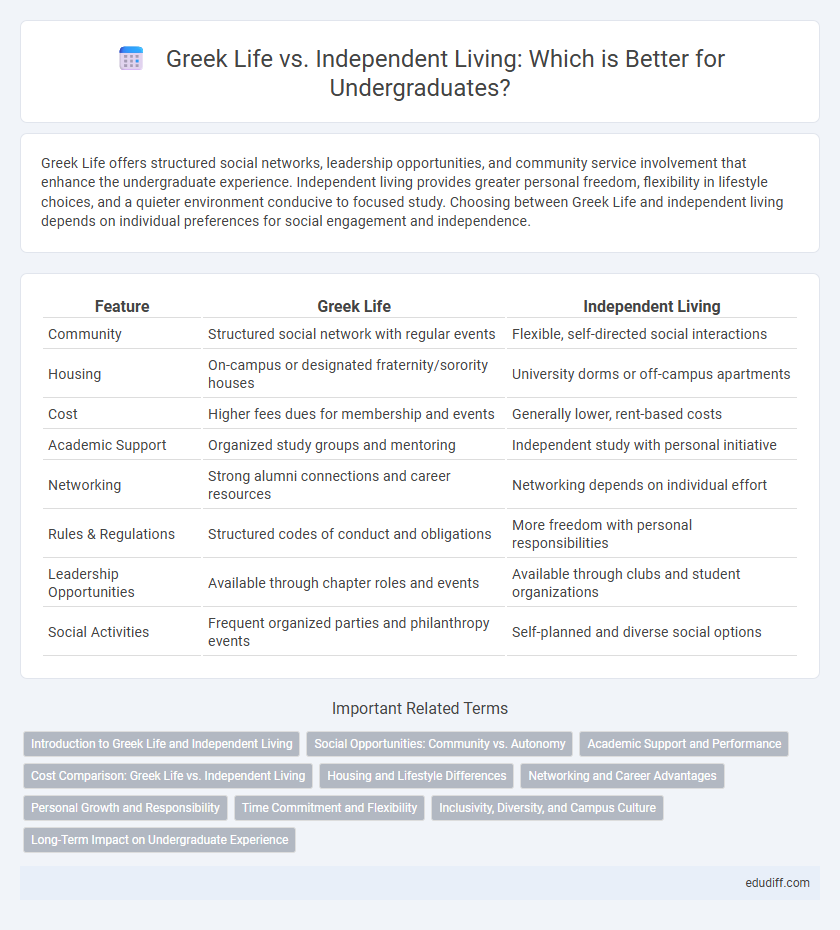Greek Life offers structured social networks, leadership opportunities, and community service involvement that enhance the undergraduate experience. Independent living provides greater personal freedom, flexibility in lifestyle choices, and a quieter environment conducive to focused study. Choosing between Greek Life and independent living depends on individual preferences for social engagement and independence.
Table of Comparison
| Feature | Greek Life | Independent Living |
|---|---|---|
| Community | Structured social network with regular events | Flexible, self-directed social interactions |
| Housing | On-campus or designated fraternity/sorority houses | University dorms or off-campus apartments |
| Cost | Higher fees dues for membership and events | Generally lower, rent-based costs |
| Academic Support | Organized study groups and mentoring | Independent study with personal initiative |
| Networking | Strong alumni connections and career resources | Networking depends on individual effort |
| Rules & Regulations | Structured codes of conduct and obligations | More freedom with personal responsibilities |
| Leadership Opportunities | Available through chapter roles and events | Available through clubs and student organizations |
| Social Activities | Frequent organized parties and philanthropy events | Self-planned and diverse social options |
Introduction to Greek Life and Independent Living
Greek Life offers a structured social environment with fraternities and sororities that foster networking, leadership, and community service opportunities on campus. Independent living promotes personal freedom and self-discipline, allowing students to create their own schedules and living arrangements without the commitments of Greek organizations. Both options significantly influence the undergraduate experience by shaping social interactions and personal development.
Social Opportunities: Community vs. Autonomy
Greek life offers structured social opportunities through organized events, philanthropy, and close-knit networks that foster a strong sense of community and lifelong friendships. Independent living provides autonomy, allowing students to create personalized social experiences and manage their time without mandatory group obligations. Both environments shape undergraduate social dynamics, influencing personal growth and campus engagement.
Academic Support and Performance
Greek life organizations often provide structured academic support through mandatory study hours, peer tutoring, and scholarship opportunities, which can enhance academic performance for members. Independent living requires students to self-manage their time and academic responsibilities without built-in support systems, demanding strong personal discipline and resourcefulness. Research indicates that students involved in Greek life may benefit from higher GPA averages and increased access to academic resources compared to their independent living peers.
Cost Comparison: Greek Life vs. Independent Living
Greek Life housing often includes meal plans, utilities, and social events, resulting in bundled costs that can sometimes be higher than independent living expenses. Independent living typically offers more flexibility in budgeting, with students paying rent, utilities, and groceries separately, often leading to variable but potentially lower monthly costs. Analyzing universities like UNC Chapel Hill reveals that average Greek housing fees can exceed $800 per month, whereas average independent rental prices range from $600 to $750 monthly, excluding additional living expenses.
Housing and Lifestyle Differences
Greek Life housing often includes communal living in chapter houses with structured social events and shared responsibilities, promoting close-knit relationships and networking opportunities. Independent living offers more privacy and personal autonomy, typically in off-campus apartments or dorms, allowing students to create individualized schedules without mandatory social obligations. Both options impact lifestyle: Greek Life emphasizes community engagement and tradition, while independent living supports flexibility and self-directed routines.
Networking and Career Advantages
Greek Life offers structured networking opportunities through brotherhood and alumnae connections, facilitating internships and job placements in diverse industries. Independent living fosters self-reliance and personalized career development but may lack the immediate professional network provided by Greek organizations. Membership in fraternities or sororities often leads to exclusive access to career resources, mentorship programs, and national alumni networks that enhance long-term career prospects.
Personal Growth and Responsibility
Greek Life promotes structured personal growth through leadership roles, community service, and collective accountability, fostering skills in teamwork and time management. Independent Living demands self-discipline and decision-making autonomy, encouraging students to develop responsibility through managing finances, household tasks, and social interactions independently. Both experiences cultivate essential life skills, yet Greek Life offers a guided framework while Independent Living emphasizes individual resilience and self-reliance.
Time Commitment and Flexibility
Greek Life often demands a significant time commitment due to mandatory meetings, events, and community service, which can limit personal scheduling flexibility. Independent living provides greater control over daily routines and free time, allowing students to prioritize academics and social activities on their own terms. Balancing coursework with extracurricular involvement is typically more manageable without the fixed obligations associated with Greek organizations.
Inclusivity, Diversity, and Campus Culture
Greek Life often promotes a close-knit community with structured traditions, yet its exclusivity can limit diversity and inclusivity on campus. Independent living fosters a more flexible environment where students from varied backgrounds freely express their identities, contributing to a more diverse and inclusive campus culture. Emphasizing open social networks and individual autonomy, independent living aligns with broader university goals of equity and cultural representation.
Long-Term Impact on Undergraduate Experience
Greek Life fosters strong networking opportunities and leadership skills that can benefit undergraduates in their professional careers. Independent Living cultivates self-reliance and time-management abilities, promoting personal growth and adaptability. Both environments shape social dynamics and academic focus, influencing long-term success and life skills development.
Greek Life vs Independent Living Infographic

 edudiff.com
edudiff.com